|
|
|
Sort Order |
|
|
|
Items / Page
|
|
|
|
|
|
|
| Srl | Item |
| 1 |
ID:
164504
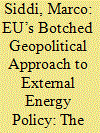

|
|
|
|
|
| Summary/Abstract |
This article argues that the European Union (EU) has pursued a geopolitical approach to its external energy policy in the Caspian region, with the aim of importing gas via routes that bypass Russia. This approach treats energy as a strategic good that governments need to secure through political, diplomatic and economic involvement in energy trade. The geopolitical approach differs from the traditional EU stance to energy policy, which focuses on market liberalization, competition, and climate targets. Through an analysis of key policy documents and statements of top EU officials in charge of external energy policy, the article shows that the Southern Gas Corridor (SGC) exemplifies a geopolitical approach to energy. In a second step, it highlights how the geopolitical logic that permeates the SGC has underplayed the important economic, technical and security challenges hindering the project. These challenges are compounded by Russia’s response, which aims at strengthening competition to SGC gas through new export pipelines (Turkish Stream). Finally, the article argues that, due to the multiple challenges faced by the geopolitical approach, the EU is more likely to achieve energy security through its traditional market liberal approach. As a large, integrated and well-regulated market, the EU can acquire sufficient and affordable energy resources by encouraging competition among external suppliers and by relying on the existing, underutilized import infrastructure. Furthermore, the implementation of the EU’s climate agenda makes long-term projects for the import of fossil fuels such as the SGC largely redundant.
|
|
|
|
|
|
|
|
|
|
|
|
|
|
|
|
| 2 |
ID:
127163
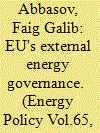

|
|
|
|
|
| Publication |
2014.
|
| Summary/Abstract |
The major objective of this paper is to apply a multidimensional lens to the European Union's (EU's) vision to the yet to be establish Southern Gas Corridor. I will argue that, the EU's natural gas vision towards the Caspian basin is based not only on bringing additional gas volumes to the EU markets in order to ensure physical security of supply. It is rather multidimensional external governance geared, firstly, towards absorbing all the actors along the whole value chain in to the EU's common energy regulatory framework and shifting energy provision from a bilateral political domain onto a multilateral market domain. Secondly, it is a process of diffusion of norms and values into the governance system of the energy partners
|
|
|
|
|
|
|
|
|
|
|
|
|
|
|
|
| 3 |
ID:
153344


|
|
|
|
|
| Summary/Abstract |
Focusing on natural gas and pipeline infrastructures, and adopting the concept of “forms of state”, the article examines the transformation of energy security politics in Europe. Three state models, with their related pattern of energy diplomacy, are sketched: the partner state, which describes the original politics of the European gas market; and the provider state and catalytic state, which describe two alternative possibilities of the emerging politics in the new institutional and ideational context promoted with the establishment of the internal energy market and the development of the EU’s external energy policy. By analysing the politics of pipeline in Southeastern Europe, the article argues that the catalytic state model with its related pattern of network energy diplomacy is more appropriate than the provider state model, supported by the market approach and its related pattern of multilateral diplomacy, to conceptualise the equilibrium emerging from the transformation of the previous system.
|
|
|
|
|
|
|
|
|
|
|
|
|
|
|
|
| 4 |
ID:
143211
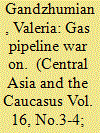

|
|
|
|
|
| Summary/Abstract |
The current stage in international relations is characterized by rapid intensification of competition in the energy sphere. The Russian-Ukrainian gas crisis of 2008-2009, as well as the conflict around Ukraine at the current stage are pushing energy supply security, one of the most important concepts in scientific literature, into the foreground. The primary importance of this concept in the increasingly unstable and rapidly changing global economy is promoting the creation of new geopolitical and geo-economic advantages for the transit countries. Moreover, uninterrupted production and safe transportation of oil and natural gas are becoming important for guaranteeing the stability of the largest economies.
|
|
|
|
|
|
|
|
|
|
|
|
|
|
|
|
| 5 |
ID:
108044
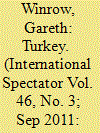

|
|
|
|
|
| Publication |
2011.
|
| Summary/Abstract |
Officials in Ankara are pressing for Turkey to become a key energy hub for the transportation of hydrocarbons from the Caspian region and the Middle East to Europe. It appears that they are seeking to secure certain strategic and economic advantages. Turkey's increasing energy needs could be satisfied, re-export rights obtained, and ambitions to become a significant regional state fulfilled which could facilitate accession to the EU. It seems more likely, though, that Turkey will become an important energy transit state, especially for the Southern Gas Corridor. Here, Turkey could still diversify its gas imports and reduce dependence on Russia.
|
|
|
|
|
|
|
|
|
|
|
|
|
|
|
|
| 6 |
ID:
166380
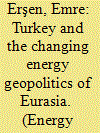

|
|
|
|
|
| Summary/Abstract |
While Turkey's geographical location is usually viewed as a major advantage in the energy sphere, since many countries in its immediate neighbourhood require active Turkish collaboration in order to export or import oil and natural gas via economically feasible pipeline projects, the ongoing political, economic and military conflicts between the same global and regional actors not only negatively affect the development of the energy transportation routes in Eurasia, but also present a major foreign policy challenge for Ankara that has traditionally sought to maintain a careful balance in its relations with the West and Russia. The goal of this article is to elaborate on the influence of such geopolitical factors in evaluating Turkey's role in terms of the oil and natural gas pipelines that are either planned or already under construction to connect the various sub-regions of Eurasia. Employing a traditional geopolitical approach, it seeks to understand what kind of geopolitical factors come into play regarding Turkey's role in the changing energy geopolitics of Eurasia and in what ways these geopolitical factors strengthen or weaken Turkey's objective to be perceived as a regional energy hub by other actors.
|
|
|
|
|
|
|
|
|
|
|
|
|
|
|
|
|
|
|
|
|